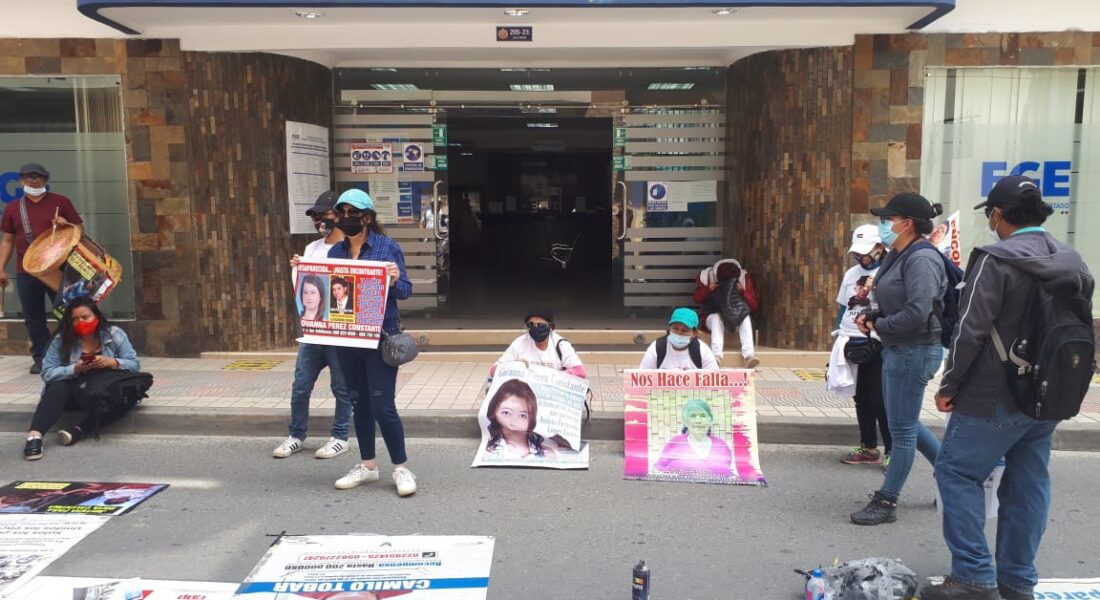Maria Isabel Espinosa Ortega
12-17-2021
“Where are they, where are they?
We come looking for them
Where are they, where are they?
We want to find them
Stop it, already
Stop fooling us
What do you accept the State all is complicated”
Proclaim Caravan for the people missing
Ecuador
The nonviolent resistance is part of the social actions promoted by groups of victims, civil society and human rights organizations in the face of the lack of responses from state institutions. Those cases of the disappeared persons in Ecuador, one of the great crises in human rights that has not been sufficiently attended by the State. For this reason, in March of this year, the Association of Relatives and Friends of Disappeared Persons in Ecuador (Asfadec), the Regional Human Rights Advisory Foundation (Inredh), decided to carry out the first caravan for the disappeared and found dead in Ecuador.
The Caravan was inspired by the Mexican experience, specifically with Julio Sanchez, founder of this initiative. The objective of searching for family members or friends who are missing is the demand for answers from the authorities and the visibility of this problem so that citizens become aware and join their fight. Julio Sanchez a leading actor in this historical process in Ecuador, sharing experiences prior to its development.
In Ecuador, the caravan began with a press conference, which gave way to a tour of the main cities of the country – departing from Quito, the capital -. Subsequently, sit-ins were developed in front of instances such as the provincial prosecutor’s offices(in charge of pre-trial investigations and criminal proceedings), provincial directorates of the Council of the Judiciary (what is the arcanum of government, administration, surveillance and discipline of the Judicial Function) and the provincial governments (representatives of the President of the Republic).
In the cities visited, relatives of disappeared persons and civil society associations were summoned to join this social demand.
There were also memory and art spaces, such as mural painting, the presentation of an album and the exhibition of documentaries; posters and music were used and public manifesto/pronouncement was read and social networks such as Twitter were used, where threads about the data of the disappeared persons, the context of the event and the current situation of the investigation were disseminated.
The lawsuits against the relatives of the disappeared persons in Ecuador show serious problems ranging from revictimization of relatives and victims, the lack of diligence in the investigations -what is related to the lack of speed, gender stereotypes, non-specialized personnel, among others -, until the abandonment and closure of dialogue and communication with the victims and civil society.
All this configured non-observance of constitutional rights that are contained in international instruments, that is, they are serious violations that deepen the pain of the relatives.
In relation to the existing legislation, it should be noted that on January 28, 2020, the Organic Law of Action in Cases of Missing and Missing Persons came into force, whose General Regulations were published on December 1 of the same year. The regulations established general coordination procedures between the institutions that make up the National Search System for Missing Persons.
But both instruments were questioned by relatives of disappeared persons and civil society organizations, among other reasons, for failing to comply with the principles of transparency and full participation. The situation of disappeared persons in Ecuador highlights the lack of preventive public policy on disappearances, a judicial action that corresponds to respect for human rights and that is in accordance with the international obligations of the State in the matter.
Thus, the national authorities face a debt that the State owes to the disappeared persons and their families. The agenda should have a priority to guarantee that the competent institutions act with due diligence and without stereotypes in the search and investigation of cases disappeared persons, specialized and sensitized personnel, within a reasonable period of time, with full observance of international norms and principles in the matter; and, ensure truth, justice, memory and the establishment of guarantees on non-repetition.
Undoubtedly, the path for the rights of disappeared persons and their families faces a series of challenges, and to address them, the voices of the victims, direct and indirect, will be indispensable.
The First Caravan for the disappeared and found dead in Ecuador was a space for demanding rights, it was also a space for memory and nonviolent resistance that has crossed borders from Mexico to Ecuador. It is a social process that seeks transnational solidarity, until it finds them.
Night and Fog
I look for you and I can’t find you
I try to hear you and you don’t hear me
I look for the brightness of your eyes
And the black of your hair
I wait for you every day
In our favorite corner
I see you in my dreams
And looking for you is the reason I wake up from them
(own author)
Maria Isabel Espinosa Ortega
Master in Law, with a mention in Constitutional Law from the University Andina Simon Bolivar, Ecuador Campus. Lawyer from the Private Technical University of Loja and human rights activist. Professor at the National University of Loja and UTPL.



